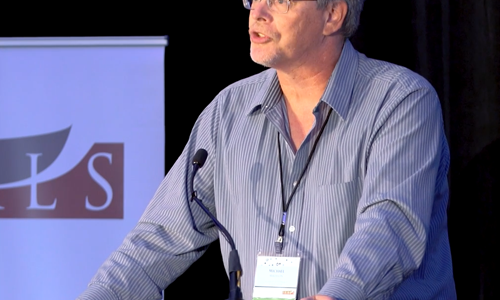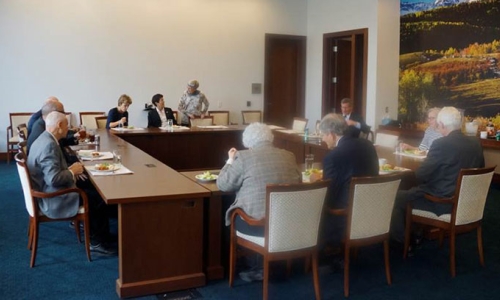January 12, 2018
The Wisconsin Lawyer recently reviewed IAALS' Foundations for Practice study and discussed some of its ties to Wisconsin's legal community. Of the more than 24,000 lawyers nationwide who participated, 500 were from Wisconsin. In the first part of the survey, at least three-fourths of those respondents said that characteristics were vital for new lawyers to have right out of school, while professional competencies and legal skills were less immediately valuable. Alli Gerkman, the director at IAALS who oversees the Foundations project, emphasized that the survey suggests that legal skills were still important, but new lawyers do not need to have them all mastered right out of law school.

Press Release
-
Carolyn A. Tyler
-
Zachary Willis
January 10, 2018
With the goal of creating a more efficient process for both parties and the courts, IAALS and the Federal Judicial Center today announced the release of new FLSA Initial Discovery Protocols designed to streamline discovery in federal courts.
January 9, 2018
In August 2016, the Conference of Chief Justices’ Civil Justice Improvements Committee released—and the Conference adopted—Call to Action: Achieving Civil Justice for All, outlining a comprehensive set of recommendations for civil justice reform. The Committee charge was limited to civil cases, and the National Center for State Courts recently launched a corollary project to explore domestic relations cases. The Family Justice Initiative is a partnership between IAALS, the Conference of Chief Justices, the Conference of State Court Administrators, and the National Council of Juvenile and Family Court Judges—with support from the State Justice Institute.

Guest Blog
December 21, 2017
The theme of the 2017 ETL conference, “Educating Tomorrow’s Lawyers… to Serve Tomorrow’s Clients,” captures perfectly the attitude that I have used for many years to frame my teaching. This year’s Ignite presentations put that theme into practice a myriad of concrete programs, in the classroom, the law clinic, and courthouse. Tech developers were represented. Law librarians. Producers of extracurricular activities. That diversity is precisely what legal education and the legal profession need. Here’s why.
December 20, 2017
No system of judicial selection and retention is perfect; however, merit selection systems attempt to balance judicial independence with voter accountability. Those are the comments of IAALS Executive Director Rebecca Love Kourlis who, along with IAALS Board Member Chief Justice (Ret.) Ruth McGregor of the Arizona Supreme Court, was interviewed by an investigative reporter for a Goldwater Institute paper on the benefits of using a merit selection system for municipal judgeships.
December 19, 2017
Diane and I have known each other since grade school. From those early days, she was a phenomenal athlete, a brilliant scholar, and a bit of a daredevil. She played field hockey, rode horses, skied competitively, attended Stanford undergrad and business school, traveled the world, and became a jet pilot. On that list along the way she added becoming an extraordinarily skilled business woman. In addition to being colleagues, we are friends. We have climbed Kilimanjaro together, ridden horses, walked ranches, and biked Italy. My husband, Tom, and I also knew her Dad, Charlie Gates. He was the one to recognize the need for and possible promise of IAALS. And then Diane carried his intention forward, and made it her own.

Expert Opinion
December 18, 2017
On the very day when the Colorado Supreme Court Justices convened for an annual holiday luncheon, which includes all former Justices, a new Justice was added to the Court. Former Chief Justices Bender and Mullarkey, former Justices Kirschbaum, Dubofsky, Hobbs, Martinez, Eid, and yours truly; and sitting Chief Justice Rice and Justices Hood, Boatright, Coats, Marquez, and Gabriel all met to share some holiday cheer and some Court administrative updates. The tradition has been ongoing since before I joined the Court—and it is a wonderful one. We all get a chance to catch up, and to feel part of an institution that is profound and meaningful.
-
Brittany Kauffman
-
Heather Buchanan
December 14, 2017
How can jury trials be better? That was the question being discussed at the Jury Improvement Lunch recently held in Denver by the New York University School of Law's Civil Jury Project. The luncheon was sponsored by a number of local bar organizations, including IAALS, and hosted by a number of local law firms. Headed by attorney Stephen Susman, the Civil Jury Project is holding similar events across the country at which judges and recent jurors are brought together to share progressive trial practices with the local bench and bar.
December 11, 2017
Nicole Bradick is a lawyer, Chief Strategy Officer at CuroLegal, and an advocate for expanding access to justice. As she writes in a recent post at Lawyerist, she was a federal court litigator for eight years and had some exposure to state court pro bono cases, but her observational visit to an eviction court this summer was the first time she ever observed such a court from the self-represented litigant’s perspective. Her verdict? “Eviction court really, really sucks.” Bradick writes that she was dismayed by the treatment of the litigants and an environment that fosters imbalance, and that she was “[e]mbarrassed because in all my time practicing law, I never bothered to sit in court and feel what it’s like in the shoes of a self-represented litigant.” She is, of course, not the only one.
December 8, 2017
Despite having some of the longest judicial terms in the country, Maryland does not have a program in place to evaluate the performance of its state judges. Coupled with recent allegations of misconduct and misapplication of law coming out of the state's courts, state watchdogs are sounding the alarm regarding the need to establish such a program. The Baltimore Sun is following the situation and including IAALS’ work in its coverage.
December 4, 2017
On January 18-19, 2018, in Phoenix, Arizona, the National Center for State Courts and the Maricopa County Superior Court will host a Civil Justice Initiative Implementation Workshop on the Nuts and Bolts of Civil Justice Reform. This workshop is part of the three-year implementation effort that follows the Conference of Chief Justices (CCJ) and Conference of State Court Administrators (COSCA) endorsement of 13 recommendations designed to transform the civil justice system in our state courts.
November 29, 2017
John Moye is one of a kind: brilliant and indomitable. IAALS itself was the result of alchemy—a coalition between John, Dan Ritchie, Charlie Gates, and me—and it began over a dinner at a Denver restaurant in the spring of 2005. John and I started talking about “what if.” John, like the other IAALS founders, has never heard the words “it cannot be done,” and IAALS was no exception.
